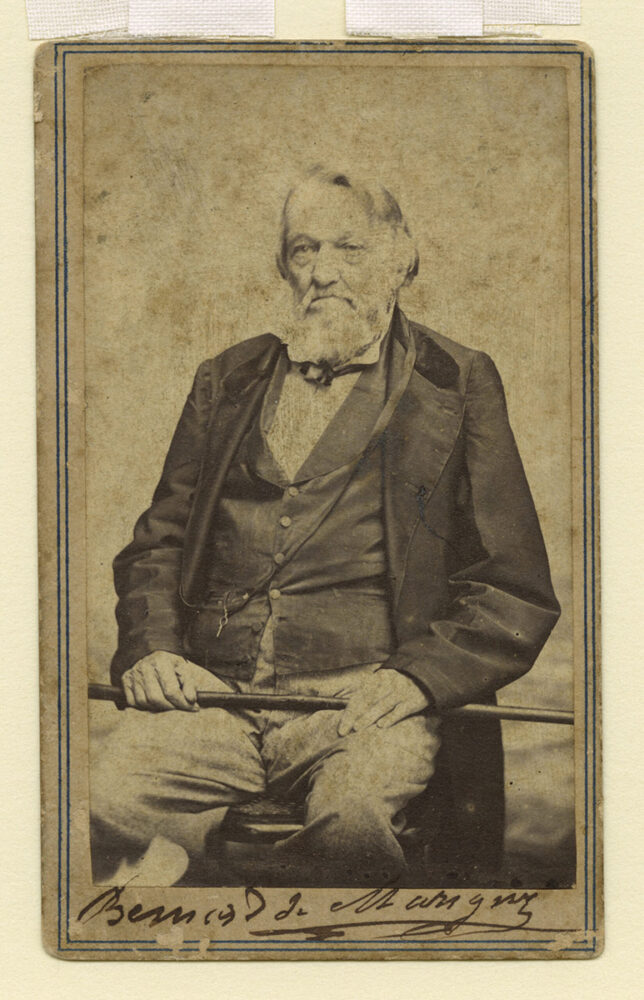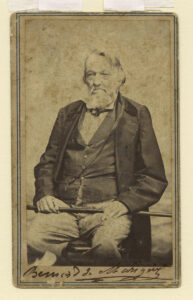Bernard de Marigny de Mandeville
One of the wealthiest Louisiana residents of his generation, Bernard de Marigny de Mandeville was active in Louisiana politics and lucratively subdivided his New Orleans plantation, creating the neighborhood that still bears his name.

The Historic New Orleans Collection
Portrait of Bernard de Marigny, 1866.
Bernard Xavier Philippe de Marigny de Mandeville was one of the wealthiest and most powerful Louisiana residents of his generation. Born in New Orleans in 1785, he was the heir to the fortune created by his father, Pierre Philippe Enguerrand de Marigny de Mandeville, and grandfather, Antoine Philippe de Marigny, Siuer de Mandeville. Beyond his wealth and social standing, he was significant because of his political activities, serving on the New Orleans City Council for over twenty years, in the Louisiana senate from 1818 to 1821, and as a participant in Louisiana’s constitutional conventions in 1812 and 1845.
Bernard de Marigny died in 1868. Many traditional sources in Louisiana history have claimed that he died having squandered his fortune, however recent scholarship and archival research shows he remained wealthy until his death.
Marigny’s great-grandfather Francois Philippe was born in Bayeux, France, and was a French soldier who migrated to Louisiana. His grandfather and father continued this tradition of military service in New Orleans, and both held high social standing in the city. By the time Bernard was born, his family was among the wealthiest families in New Orleans, owning large tracts of land and benefiting from the labor of the many people they enslaved.
Marigny lucratively subdivided his New Orleans plantation in 1806, which created the neighborhood that still bears his name, the Faubourg Marigny. He had hoped to form a new economic center of New Orleans that would rival the French Quarter, but his hopes were dashed by the rise of American economic power concentrated in the Faubourg St. Mary (a neighborhood located on the upriver side of what is now Canal Street). While the creation of the Faubourg Marigny added to his wealth, it did not reshape the economic landscape of New Orleans as he had hoped. It did, however, become home to many refugees from St. Domingue, a former French colony in the Caribbean, who reshaped the culture and landscape of New Orleans in their own ways.
At the constitutional convention of 1844–1845, Marigny was one of the few French-descended delegates. There he advocated for the rights of naturalized citizens to vote and to hold political office. He was a lifelong advocate for the power of French Creoles in Louisiana, frequently coming into conflict as he tried to limit the power of American settlers and citizens after the Louisiana Purchase. He strove for political power, running for governor twice (1824 and 1828), but was never elected. His political campaigns took place when parties and candidates were bitterly divided between French Creoles and Americans.
Marigny served as an aide to Governor William Claiborne during the Battle of New Orleans. He advocated to General Jackson that Jean Lafitte, his brother Pierre, and their band of pirates be allowed to enlist so that they could prove their loyalty, although General Jackson refused this request. Despite Marigny’s many political and social pursuits, his enemies criticized his lack of formal education and mediocre spoken English.
Many books and contemporary newspaper accounts referenced Marigny’s staggering wealth and luxurious lifestyle. His reputation as an aristocratic playboy was enhanced by the frequent duels in which he engaged, even though he stopped dueling after the death of his son, Gustave. He hosted many famous visitors to New Orleans, including Andrew Jackson and the Marquis de Lafayette, and embraced a lavish lifestyle, both at his mansion in New Orleans and his large estate on the north shore of Lake Pontchartrain, Fontainebleau. In the 1820s, he subdivided and sold some of this land in St. Tammany Parish to create the town of Mandeville, which still bears his family name.
